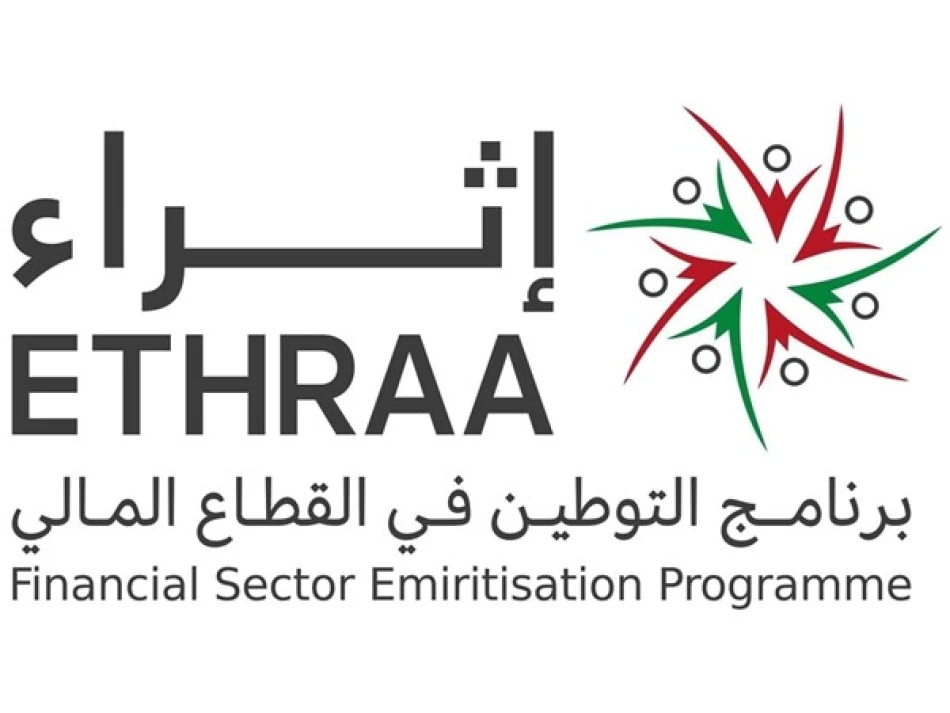
Ignite Your Career at the 9th Edition of Enrichment Recruitment Fair
UAE Launches Ambitious Push to Localize Financial Sector Workforce
The UAE is intensifying efforts to build a homegrown financial services workforce as the Emirates Financial Institute prepares to host its ninth annual "Ethraa" employment exhibition. With 60 major financial institutions participating and a target of creating 1,900 jobs annually for Emiratis, the initiative reflects the country's strategic pivot toward reducing dependence on foreign expertise while capitalizing on the digital economy transformation.
Major Financial Players Rally Behind Emiratization Drive
The one-day Dubai event, launching tomorrow, brings together the UAE's financial ecosystem heavyweights including the Central Bank of the UAE, the UAE Talent Competitiveness Council "Nafis," and the Al-Futtaim Group. The participation roster spans traditional banking giants, fintech startups, insurance providers, and currency exchange companies—signaling broad industry commitment to workforce localization.
This comprehensive approach mirrors similar initiatives in Saudi Arabia's Vision 2030 program, where the kingdom has mandated specific Saudization quotas across financial services. However, the UAE's strategy appears more incentive-driven, focusing on skills development rather than regulatory mandates.
Timing Aligns with Digital Economy Transformation
The exhibition's emphasis on future skills—particularly in fintech, artificial intelligence, and data analytics—comes as the UAE positions itself as a global hub for digital finance. Saif Hamid Al Dhaheri, Assistant Governor of the UAE Central Bank, highlighted that this edition coincides with the country's "accelerated transformation toward a digital economy."
This timing is strategic. As traditional banking roles evolve and new fintech positions emerge, the UAE aims to ensure Emiratis are equipped for tomorrow's financial landscape rather than yesterday's. The approach contrasts with other Gulf states that have struggled to match citizen skills with rapidly evolving market demands.
Skills Gap Challenge
The focus on specialized workshops and career guidance reflects an acknowledgment of existing skills mismatches. While the UAE produces graduates in finance and IT, the practical application of emerging technologies like blockchain, digital payments, and robo-advisory services requires continuous upskilling—a gap the Ethraa program directly addresses.
Market Implications for Financial Institutions
For participating companies, the initiative presents both opportunity and obligation. Access to a pipeline of locally-trained talent could reduce recruitment costs and cultural integration challenges that often accompany international hiring. However, institutions will need to invest significantly in training programs and potentially adjust salary expectations to attract Emirati talent away from traditionally preferred government sector roles.
The program's success could influence regional competitors. If the UAE successfully builds a robust local financial workforce, it may gain competitive advantages in areas like regulatory compliance, customer relationship management, and long-term institutional knowledge retention.
Beyond Job Creation: Economic Diversification Strategy
Dr. Faisal Al Ayyan from the Higher Colleges of Technology emphasized that developing national competencies supports the UAE's broader economic transformation. This connects to the Emirates' Vision 2071 goal of becoming the world's best country by its centennial—an ambition requiring deep expertise across all economic sectors.
The 1,900 annual job target, while significant, represents a measured approach compared to more aggressive localization drives in neighboring countries. This suggests the UAE prioritizes sustainable workforce development over rapid numerical targets that might compromise service quality or competitiveness.
Regional Context and Global Trends
The initiative reflects broader Gulf Cooperation Council efforts to reduce expatriate workforce dependency while building knowledge economies. Unlike Saudi Arabia's more regulatory approach or Qatar's post-World Cup economic diversification, the UAE's model emphasizes public-private collaboration and skills alignment with market needs.
Globally, similar programs in Singapore and Hong Kong have shown that financial hubs can successfully develop local talent without sacrificing their international competitive edge—provided the focus remains on genuine capability building rather than mere employment quotas.
Most Viewed News

 Layla Al Mansoori
Layla Al Mansoori






